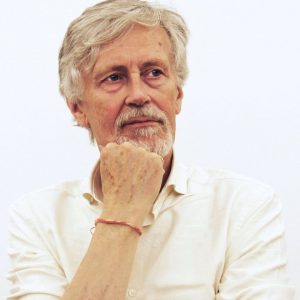What if the Coronavirus is also a disease of communication?
The Belgian-Canadian sociologist and journalist Derrick de Kerckhove, Marshall McLuhan’s last pupil and moral heir, is convinced of this. After studying with the great author of the “global village”, de Kerckhove dedicated himself to the analysis of the influence of the media on man and he is the author of several essays, including “The Augmented Mind”, released in 2010.
Derrick trained at the University of Toronto, where he has been teaching for some time; he is the scientific director of the Osservatorio TuttiMedia, founded in 1996 in Rome, with the aim of understanding how our lives have changed with new technologies.
And this is not, for the professor, the only link with Italy. De Kerckhove has also obtained a chair in Sociology of Digital Culture at the Federico II University of Naples. Right in the Campania region, in particular in Vico Equense, Derrick is in these days, stuck due to the emergency. Mediaddress could not miss the opportunity to interview him!

How was the Coronavirus communicated in Italy? Did the media contribute to correct information or have they made any mistakes?
“In January, when the media started talking about Coronavirus, I wasn’t in Italy. Initially, I didn’t give much weight to the problem. It wasn’t until the beginning of March, when the news began to multiply, that I realized what was happening. From Canada, where I live, I came to Europe and had to make the decision to stay here. I also avoided going to China, as I had planned. We have all been overwhelmed by an avalanche of contradictory news. The news has been accompanied by fakes, all over the world, especially in Britain. The media are the media. They often seek sensationalism”.
Is it right to use the term “infodemia” in this context?
“Absolutely. I’ve always associated Coronavirus virality with information. And I think the ruin of the economy, as well as health, is due to the lack of control of the media system. I see the network as a global limbic system, bringing uncontrollable emotions from one part of the world to the other. This has produced, everywhere except in the Far East, instinctive escape reactions. Instead of considering the Coronavirus as a global problem, the answer has been the total closure of activities and borders. This strategy, in my opinion, has proved ineffective in Europe. Before the epidemic became a pandemic, the states should have found a common strategy, ensuring a comprehensive medical service accessible to all”.
In your opinion, how does Giuseppe Conte communicate?
“I can’t say exactly. Conte gives confidence. At first, when he was appointed President of the Council, he seemed to me unsuitable for the role. He appeared as a man, who happened to be in an unexpected situation, hiding his anxiety behind a challenging smile. When the fight against Covid-19 became difficult, Conte demonstrated the attitude and ability of a true head of State. It is also true that it is easy for Italian citizens to love a president like Conte, when compared to others like Trump and Bolsonaro. Conte is an adult, something very rare among politicians”.
During the emergency, everything goes digital. Live Facebook broadcasts concerts, lectures, readings aloud. The aperitif was born via social channels, as well as birthday parties. Is it real sharing or just «wanting to be there»?
“It is a stage of acceleration of the so-called «digital transformation». This expression is usually used in the business sector. In fact, it touches each of us in a profound way, like learning to read and write. Printing, an invention of Gutenberg, has produced an epochal change in civilization of the West. No one, in my opinion, has understood that digital change is infinitely more powerful. Our jokes on smartphone screens, now that we are locked indoors, are no less than the greedy response to a thirst for long-distance communication that has long since overcome, especially for young people, the face-to-face of the past. Is the street empty today? It was already empty before”.
Post-Coronavirus: how do you imagine?
“Post-Coronavirus depends on how long the Coronavirus will last. If it stopped within three months, nothing serious would change. We will return to everyday life, just enriched by an exceptional experience, to remember forever and be prepared for the next time. If, on the contrary, it lasts another year, we will have the chance to start more or less from scratch and bring to the attention the real problems of our time: the environmental pollution and poverty that reigns in most of the world. Before the pandemic, our lives were running at suicide speed. We were stopped at half speed. This is a time for healthy reflection”.
